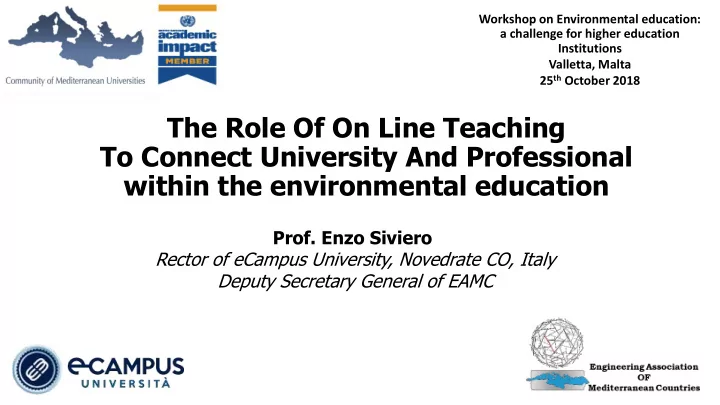

Workshop on Environmental education: a challenge for higher education Institutions Valletta, Malta 25 th October 2018 The Role Of On Line Teaching To Connect University And Professional within the environmental education Prof. Enzo Siviero Rector of eCampus University, Novedrate CO, Italy Deputy Secretary General of EAMC
Agreements wit ith Professional Orders
Advanced Training Courses • Proposal of Agreements with Professional Orders: • Attending high specialization paths grants professional credits (CFP) • These professional credits can be recognized as university credits (CFU) provided that practitioners enroll at eCampus University • These guarantees a facilitated degree path for practitioners wanting to get a University degree
Advanced Training Courses • Through the advanced training courses, carried out in accordance with professional orders, practitioners acquire contemporarily professional and university credits. • The high-level training courses deal mainly with specific aspects of civil engineering, for example: the safety of the structures and the ordinary and extra-ordinary maintenance of the structures themselves.
eCampus University Dis istance Learning Model
e-Campus Distance Learning Model Each course has an assigned amount of credits (CFU) Each course counts 6, 9 or 12 CFU, e.g.: - Meccanica delle strutture : 9 CFU - Progetto di strutture : 12 CFU - Teoria e progettazione dei ponti : 9 CFU Educational teaching (DE) 16 hours of lessons Interactive teaching (DI) ( 8 lessons , 2h each) Other (study counseling) 1 CFU = 25 hours of studying 9 hours of individual studying 6 h ≤ (DE+DI) ≤ 10 h DE & DI constraints: DE ≥ 1 h DI ≥ 1 h Each course is composed by learning modules, each learning module is composed by 8 lessons
WHAT: HOW: 6 h ≤ (DE+DI) ≤ 10 h 6 h ≤ other ≤ 10 h In house Video lecture (you see the lecturer) DE At home Virtual classroom (web (you see an audio conference on theoretical commented ppt) 1 CFU = 8 lessons = 16 h aspects) Conceptual Maps Wiki Exercises with an explicit E-Portfolio teacher’s feedback DI Quiz Aula virtuale (web conference on Forum performed exercises or projects) Slides (ppt) Teaching materials prepared by the teacher Other Documents (pdf) Exercises without an explicit teacher’s feedback
Examples of Educational teaching (DE)
Examples of Educational teaching (DE)
Examples of Interactive teaching (DI): exercises
eCampus University and EAMC for accreditation programs in in Mediterranean countries
Double degree agreements of f eCampus • Agreement with foreign partner universities: • Comparing study plans of common or similar degree courses • Recognizing exams and credits of common or similar degree courses • Students can pass not recognized courses by studying online on eCampus didactic materials while they are enrolled with the partner university • Students get their foreign degree and contemporarily attend online eCampus courses • Once students get the foreign degree, and have passed all not recognized courses at eCampus, they can perform an internship and discuss final thesis in Italy at eCampus University
Double degree agreements in Egypt • Involved universities: • Badr Univeristy • Ain shams University • Involved degree courses: • Industrial Engineering, Energetic curriculum • Civil and Environmental Engineering • Computer and Automation Engineering
Double degree agreements in Tunisia • Involved universities: • Université Centrale • Time University • UPES – Université Privée des Etudes Scientifiques et Technologiques • Involved degree courses: • Civil and Environmental Engineering • Computer and Automation Engineering • Economics and Business Management
The MEDACCR European proje ject Call Duration Coordinator Responsible Abstract
Contribution of f eCampus to achieve MEDACCR obje jectives MEDACCR Objective eCampus Contribution Design of student-centered IREC International Relations and Erasmus Committee Engineering Study Programs Align internal QA to the European PQA University quality supervision Standards On-line documentation of Quality Website, Assurance VLE Virtual Learning Environment Disseminate the project results SMARTEST Research Centre Smart Engineering Solutions & Technologies
The MEDACCR European proje ject Main Aim To set up and implement an on-line Quality Assurance (QA) system and an accreditation system of Engineering Study Programmes (ESPs) in Algeria, Jordan and Tunisia Partner Countries (PCs), consistent with the EUR-ACE Framework Standards and Guidelines (EAFSG) .
The MEDACCR European proje ject Specific Project Objectives To promote the design of student-centred ESPs focused on the definition of learning outcomes consistent with the programme outcomes shared at European level. To bring the internal Quality Assurance (QA) of ESPs into line with the Standards and Guidelines for QA in the European Higher Education Area (ESG).
The MEDACCR European proje ject To promote transparency and comparability of ESPs through an on-line documentation of their QA. To identify/create national centres for the EUR-ACE accreditation. To promote international recognition of ESPs through EUR-ACE accreditation.
The MEDACCR European proje ject To guarantee the sustainability of the project results through the involvement of the academic and administrative staff of the PUs. To promote the dissemination of the project results through the agreement with Ministries of Higher Education of the PCs for the recognition/recommendation of EUR-ACE accreditation at national level.
Recommend
More recommend